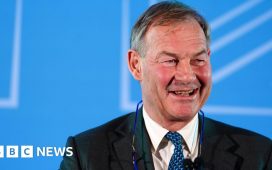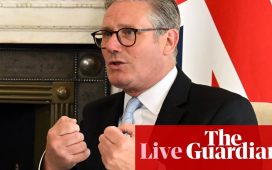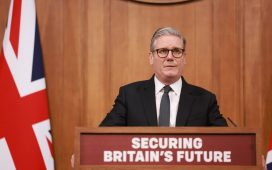Laura Kuenssberg and Jennifer McKiernan,BBC News
 PA Media
PA MediaLong-serving Conservative cabinet minister Michael Gove has announced he will not stand at the general election, as the second full day of campaigning was marked by an exodus of MPs.
Mr Gove, first elected MP for Surrey Heath in 2005, is understood to have made the decision in the last couple of days.
He is the most high-profile of the nearly 80 Conservative MPs who have stepped down ahead of the 4 July vote – alongside public health minister Dame Andrea Leadsom.
Mr Gove has been a close ally of Rishi Sunak, who he said “has the plan our country needs”.
As Parliament was prorogued and a handful of government bills rushed through before the cut-off:
- Plans to reform homeowners’ rights in England and Wales passed in time, but without the Conservative manifesto commitment to restrict ground rents paid by leaseholders to next to nothing
- A Conservative promise to abolish no-fault evictions for renters failed to get over the line, but a bill which paves the way to establish an independent Infected Blood Compensation Authority passed
- Rishi Sunak admitted he was disappointed his plan to phase out smoking did not have enough time to become law, but he said it would be back if the Conservatives are returned to government
- Labour leader Keir Starmer said he can’t commit to scrapping university tuition fees – which he backed when running to be Labour leader – or repealing the two-child benefit cap, blaming a lack of resources
Mr Gove had a majority of 18,349 at the last general election. But his Surrey Heath seat is a key Liberal Democrat target on 4 July.
The Lib Dems claimed Mr Gove was “running scared” of their candidate Alasdair Pinkerton, who came second in the constituency in 2019.
Lib Dem Treasury spokesperson Sarah Olney MP said: “The drumbeat of Conservative MPs stepping down has been getting louder as the days go by – now it’s deafening.”
A long ministerial career saw Mr Gove first enter the cabinet as education secretary when David Cameron became prime minister in 2010.
Alongside Mr Johnson, he was one of the leaders of the Leave campaign in the 2016 Brexit referendum.
And he has been a key part of Mr Sunak’s top team as housing minister.
The PM has yet to comment on Mr Gove’s resignation, but earlier insisted he is “pumped up” on a whirlwind tour of all four nations of the UK in his first day of campaigning.
Also on Friday, energy regulator Ofgem confirmed consumer bills will drop again from July, by seven per cent.
Mr Sunak said the fall showed “the economy has turned a corner” and “our plan is working”.
In Scotland, Labour leader Sir Keir Starmer was also eager to focus on energy, arguing that despite the falling price cap, an average family would still pay around £400 ($509) more annually than a few years ago.
He insisted his party’s plans to set up a new “Great British Energy” firm would help bring down bills and spearhead a Scottish-led “clean energy revolution”.
Elsewhere in Scotland, Deputy First Minister Kate Forbes spent the second day of campaigning in the Highlands, saying rural Scotland was struggling with exports due to Brexit and pledging that SNP MPs would stand up for them in Westminster.
‘New generation should lead’
In a letter to his local Conservative Association chairman, Mr Gove thanked party members for helping him to win his seat at five general elections.
He said his parents, who adopted him when he was four months old, brought him up with the belief that “to help others is the greatest gift you can be given” as he grew up in Aberdeen.
Mr Gove said he could “never have imagined” having the opportunity to be an MP sitting in the Commons, “let alone around the Cabinet table” serving under four prime ministers – an unbroken 14 years apart from the brief premiership of Liz Truss.
He said he was grateful to Lord Cameron for giving him the chance to pursue education reform, Mrs May “who asked me to support her in challenging times”, and Mr Johnson “who delivered Brexit and set out the levelling up vision”.
Mr Sunak, he added, “asked me to return to government when I believed my ministerial career had ended” and allowed him to pursue the cause of levelling up.
In a hint at his 2022 divorce from journalist Sarah Vine, who he married in 2001 and with whom he has two children, Mr Gove said: “I also know the toll office can take, as do those closest to me.”
He added: “The chance to serve is wonderful. but there comes a time when you know that it is time to leave. That a new generation should lead.”
On Brexit, he said: “I am proud to have led the Vote Leave campaign alongside Boris Johnson and Gisela Stuart – which secured the largest mandate in modern British history for a vote to leave the European Union and take back control of our political destiny.
“Fundamentally our country is stronger with politicians in Westminster able to control our laws, our borders and our money.
“Since 2016 we have also increased NHS funding by considerably more than £350m a week.”
Although he said “I have undoubtedly made mistakes”, Mr Gove said he had “always tried to be a voice for those who have been overlooked and undervalued”.
“I have tried to fight for greater social justice. My education reforms were designed to build a country where everyone – no matter their background – can become the authors of their own life stories,” he added.
Also on the campaign trail, Sir Keir committed to be willing to take part in two TV election debates with Rishi Sunak.
It came after the PM accused Sir Keir of not wanting to debate him and Mr Sunak telling the Daily Telegraph he is prepared to debate his opposite number every week of the six-week campaign.












